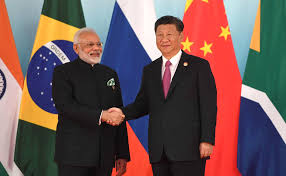Key points:
Canada’s Unfounded Allegations – Canada accused India of involvement in Nijjar’s assassination without concrete evidence, which a Canadian commission later disproved.
Disinformation as a Political Tactic – The report suggests Canada’s claims may have been part of a broader disinformation campaign, harming diplomatic relations.
Judicial Weaknesses in Canada – The prolonged legal proceedings and the bail granted to suspects highlight inefficiencies in Canada’s judicial system.
International Fallout – The baseless allegations strained India-Canada relations, led to diplomatic expulsions, and damaged Canada’s credibility on the global stage.
Buzzplus Bureau, Jan 30: In June 2023, the assassination of Hardeep Singh Nijjar, a prominent Sikh separatist leader, in Surrey, British Columbia, led to a significant diplomatic rift between Canada and India. Canadian Prime Minister Justin Trudeau alleged potential involvement of Indian agents in Nijjar’s murder, a claim that India vehemently denied. A subsequent Canadian commission report found “no definitive link” between India’s government and the killing, highlighting the complexities of disinformation and its impact on international relations.
Disinformation as a Political Tool
The commission’s report highlights the strategic use of disinformation in international politics, emphasizing its deployment as a retaliatory measure against actions that oppose a state’s interests. In this context, the premature allegations directed at India regarding the assassination of Hardeep Singh Nijjar can be interpreted as a form of disinformation, potentially serving to divert attention from domestic challenges or to apply political pressure. Such tactics not only mislead the public but also erode the credibility of the nation making the accusations.
Disinformation, defined as the deliberate dissemination of false or manipulated information with the intent to deceive, has become a prevalent tool in geopolitical strategies. States may employ disinformation to undermine adversaries, sway public opinion, or distract from internal issues. In the case of the allegations against India, the absence of concrete evidence, as noted in the commission’s findings, suggests that the claims may have been hastily made, possibly influenced by internal political dynamics or external pressures.
The report further underscores that disinformation is often utilized to retaliate against decisions that conflict with a state’s interests. This observation implies that the allegations against India could have been part of a broader disinformation campaign, aiming to manipulate public perception and achieve specific political objectives. Such actions not only mislead the public but also risk damaging the international standing of the accusing nation, especially when the claims are unsubstantiated.
Moreover, the use of disinformation as a political tool can have far-reaching consequences. It can strain diplomatic relations, as seen in the tensions between Canada and India following the allegations. Additionally, it can undermine public trust in governmental institutions and leaders, particularly if the disinformation is later exposed. Therefore, it is crucial for nations to exercise caution and ensure that any allegations made on the international stage are supported by credible evidence, to maintain both domestic and international credibility.
Canada’s Shifting Narrative
In September 2023, Canadian Prime Minister Justin Trudeau publicly asserted that there was “credible evidence” implicating Indian agents in the assassination of Hardeep Singh Nijjar, a prominent Sikh separatist leader, in British Columbia. This serious allegation led to a significant diplomatic rift between Canada and India, resulting in the expulsion of diplomats and heightened tensions between the two nations.
However, a comprehensive report by a Canadian commission has since found “no definitive link” between India’s government and Nijjar’s killing. The 123-page report, titled “Public Inquiry Into Foreign Interference in Federal Electoral Processes and Democratic Institutions,” was released in January 2025 and concluded that while foreign interference is a concern, there was no concrete evidence to substantiate claims of India’s involvement in this particular case. ([indianexpress.com](https://indianexpress.com/article/world/canada-report-no-definitive-link-india-role-nijjar-killing-9806595/?utm_source=chatgpt.com))
This discrepancy between the Prime Minister’s initial assertions and the commission’s findings has significant implications for Trudeau’s credibility. The absence of concrete evidence suggests that the initial allegations may have been premature, potentially influenced by internal political considerations or external pressures. Such hasty judgments can undermine public trust in leadership and strain diplomatic relations unnecessarily.
The situation also highlights the complex role of disinformation in international politics. The commission’s report noted that “disinformation is used as a retaliatory tactic to punish decisions that run contrary to a state’s interests.” This observation suggests that the allegations against India could have been part of a broader disinformation campaign, either originating domestically or from other foreign actors, aiming to manipulate public perception and political outcomes.
Furthermore, the incident has had tangible repercussions on Canada-India relations. The diplomatic fallout included the expulsion of six Indian diplomats from Canada, a move that was mirrored by India in a tit-for-tat response. These actions have stalled trade negotiations and cooperation on various fronts, illustrating how unverified allegations can escalate into significant geopolitical tensions.
The lack of definitive evidence supporting Prime Minister Trudeau’s initial claims against India underscores the dangers of making premature allegations without substantial proof. Such actions not only jeopardize diplomatic relationships but also raise questions about the internal factors that may drive a nation’s foreign policy decisions. It is imperative for leaders to exercise caution and ensure that their statements are backed by credible evidence to maintain international trust and stability.
The unfounded allegations led to a diplomatic fallout, with both nations expelling diplomats and experiencing strained bilateral ties. Trade negotiations stalled, and collaborative initiatives were put on hold. This deterioration in relations highlights the consequences of baseless accusations and underscores the need for thorough investigations before making international claims.
Legal and Judicial Implications
Following the assassination of Hardeep Singh Nijjar in June 2023, Canadian authorities arrested four Indian nationals in May 2024 from various locations across the country. These individuals faced charges related to Nijjar’s murder. However, the judicial proceedings have encountered significant delays, with the trial being adjourned multiple times. As of January 2025, reports indicate that the trial has been postponed five times, primarily due to delays in the prosecution’s presentation of evidence during preliminary hearings.
In a recent development, a Canadian court granted bail to all four accused individuals. This decision is perceived as a setback for the Canadian government, highlighting challenges within the judicial process. The protracted nature of the trial raises concerns about the efficiency and effectiveness of Canada’s legal system, especially in handling high-profile cases with international implications. Such delays not only impede justice for the victim and their family but also risk prolonging diplomatic tensions between Canada and India, as the unresolved legal proceedings continue to be a point of contention. ([tribuneindia.com](https://www.tribuneindia.com/news/punjab/canadian-court-grants-bail-to-4-indians-in-nijjar-murder-case/?utm_source=chatgpt.com))
The Khalistan Movement’s Influence
The Khalistan movement, which advocates for an independent Sikh homeland, has been a longstanding and contentious issue in India-Canada relations. While the movement has minimal support within India, it maintains pockets of backing among segments of the Sikh diaspora in Canada. India views the Khalistan movement as a direct threat to its sovereignty and territorial integrity. Consequently, India’s government has expressed concerns over what it perceives as Canada’s leniency towards Khalistani activities within its borders.
Canada’s approach to Sikh separatism is influenced by its commitment to freedom of expression and assembly, allowing pro-Khalistan advocacy as long as it remains within legal bounds. However, this stance has led to diplomatic friction with India, which urges Canada to take a firmer position against Khalistani elements. The presence and activities of Khalistan supporters in Canada have been a significant irritant in bilateral relations, contributing to mistrust and diplomatic challenges.
The assassination of Nijjar, a prominent figure in the Khalistan movement, and the subsequent allegations and legal proceedings have further complicated the diplomatic landscape. India’s government has consistently denied involvement in Nijjar’s killing, labeling the accusations as politically motivated. The situation underscores the intricate interplay between domestic policies and international relations, where internal approaches to minority rights and political expression can have far-reaching diplomatic consequences.
The delays in the legal proceedings related to Nijjar’s murder highlight potential inefficiencies within Canada’s judicial system, which may exacerbate diplomatic tensions with India. Simultaneously, Canada’s handling of the Khalistan movement reflects a complex balance between upholding democratic freedoms and managing international diplomatic relationships. Addressing these challenges requires careful navigation to ensure justice, maintain domestic principles, and foster positive bilateral relations.
International Repercussions of Unproven Allegations
The unsubstantiated allegations against India have led to significant international repercussions, affecting both bilateral relations and Canada’s global standing. The diplomatic rift between Canada and India intensified following Prime Minister Justin Trudeau’s public assertion of India’s involvement in the killing of Sikh activist Hardeep Singh Nijjar. India has consistently denied these claims, leading to a series of retaliatory measures, including the expulsion of diplomats and the suspension of visa services for Canadians.
These actions have strained diplomatic ties, halting trade negotiations and fostering mutual distrust. The absence of concrete evidence to support the allegations has further complicated the situation, leading to skepticism among international observers. Unproven claims can erode a nation’s credibility, causing allies and partners to question its judgment and reliability in future diplomatic interactions. This erosion of trust underscores the critical importance of evidence-based assertions in international affairs.
The situation also highlights the broader issue of foreign interference and disinformation in democratic institutions. A recent Canadian probe revealed that foreign states, including India, have attempted to interfere in Canada’s democratic processes. The report emphasized the need for a more coordinated and urgent response to such threats.
The baseless allegations against India have not only strained bilateral relations but also impacted Canada’s international reputation. This situation underscores the necessity for nations to base their diplomatic assertions on solid evidence to maintain trust and cooperation in the global arena.
Media’s Role in Shaping Public Perception
Media coverage plays a pivotal role in shaping public opinion, especially during international disputes. Sensationalist reporting, lacking thorough verification, can inadvertently amplify disinformation, leading to skewed perceptions and potentially influencing policy decisions. This underscores the media’s profound responsibility to ensure accurate and balanced reporting, particularly on matters with significant diplomatic implications.
In conflict situations, the media’s portrayal can either escalate tensions or contribute to resolution. For instance, during the Vietnam War, extensive media coverage is believed to have played a key role in turning U.S. public opinion against the war, eventually influencing the U.S. decision to withdraw. However, the media can also contribute to conflict de-escalation. Many people believe that the media coverage of the conflict played a key role in turning U.S. public opinion against the war in Vietnam. Lack of popular support eventually forced the U.S. to withdraw from that conflict. One seminar participant suggested that the constant live coverage in the early stages of the Yugoslavian conflict helped to contain that conflict by allowing the parties to publicly vent their emotions and positions.
To uphold ethical standards, journalists must exercise vigilance in covering conflict situations where objective and quality journalism and reporting are key tools in countering disinformation. This involves verifying facts, providing context, and presenting multiple perspectives to offer a comprehensive view of the situation. The ethical journalist will humanize the conflict process—putting names to faces; talking to the victims of war on all sides; and providing context to the events being reported. By doing so, the media can foster a more nuanced understanding among the public, reducing the risk of polarization and misinformation.
The media wields significant influence over public perception during international conflicts. Sensationalist or unverified reporting can exacerbate tensions and misinform the public. Therefore, it is imperative for journalists to commit to accurate, balanced, and ethical reporting, ensuring that their coverage informs rather than inflames, and contributes constructively to public discourse and policy formulation.
The episode surrounding Hardeep Singh Nijjar’s assassination and the subsequent unfounded allegations against India serve as a cautionary tale about the dangers of disinformation and hasty political judgments. It underscores the necessity for thorough investigations, evidence-based assertions, and responsible media reporting to maintain international harmony and uphold the principles of justice.




